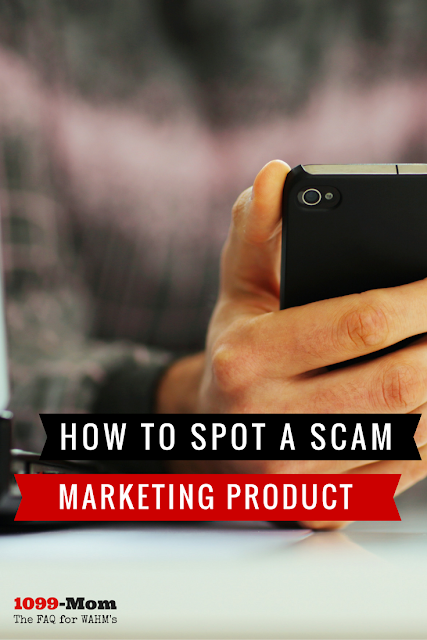3 Ways to Know if That Marketing Tool, Course, or eBook is a Scam
We have reviewed quite a few business and marketing books and products over the past few years on 1099 Mom. Many of them were pretty decent tools, modestly-priced, and written by people I would consider trustworthy. We have tried to present an honest look at each of them, even though we do earn commission on some through our affiliate links or partner programs.
But 2016 was a disappointment for marketing tools, especially among social media marketers and bloggers. And that's part of the reason I took a break from reviewing anything and only promoted one or two really good tools. As a small business person (and a parent), I know you don't have extra cash. I would feel terrible promoting something that wasn't an amazing value. That's why I was so bummed to see so much cash made from faulty guides and affiliate marketing machines.
So, how can you tell if something is a good deal? What do you do if you suspect the "hot" new tool is really just a ploy to get your money? I wanted to give a quick heads up on how shady some marketers are out there and how many bloggers are making their cash. Avoid any of these red flag products, if you can.
How to Avoid a Bad Marketing Tool
1. Sign up for and dissect their "free" gifts
All marketing experts use free gifts to get subscribers these days. And the practice of doing so isn't a bad thing. I know many great marketers who give away some of the very same things they sell as a "thank you" for joining their lists. But lately, some of these freebies have belonged in the recycling bin.. not on my desktop.
If you are concerned about whether an expert's new book or course is worth the money, see if they are offering a freebie on their website for joining their list. Use a "throw away" email set up specifically for this type of research, if you like. Then sign up and see what they give you. If it's a crappy template that you could have downloaded for free from the Microsoft Word website, know that their idea of "value" -- and yours -- probably won't mesh. The good experts will give you something amazing for free and lure you in with trust and knowledge. Those are the type of people I'm willing to give my money to!
Example: I recently signed up for a "launch" planner from a blogger who made $100,000 in her first year. The planner was a one page spreadsheet with nothing on it but a place to write my project names and due dates. In other words, she figured I was too lazy to create a Google Doc. (And her branding was all over the free good, of course.)
2. Check on those Income Reports
I remember when personal finance blogging was young. Everyone shared their net worth reports with the world, even including things like 50 cents coupons and the baby clothes they sold on eBay. All of this transparency led to greater trust when it came time for these same bloggers to hawk Dave Ramsey toolkits and their newest partnership with meal planning services.
They did it the right way, in my opinion. It was easy to see if they really knew enough about saving money to be offering advice. Marketing experts and bloggers have started doing the same thing; they often share how they made tens of thousands of dollars in a month with their amazing blogging skills! Wouldn't you love to buy their book that shows you how to do it, too?
Take a good look at those income reports. In them, lies the secret to how that expert really made their money. You may see that a BIG chunk of their income (usually 80% or more) doesn't actually come from writing, selling anything, or teaching anything. It may come from affiliate sales. And that should be a HUGE red flag that they might not know how to do anything but influence others to buy stuff. Unless you are buying a book or course on getting others to buy stuff -- which is legitimate (just not what most people are looking for) -- look elsewhere for your expert advice.
(See also: Affiliate marketing vs. direct sales: What you Need to Know)
Example: I purchased a $10 ebook on making money blogging. It contained 2 pages of generic advice found as an article for free on the blog of the author. The remaining 8 pages was a step-by-step guide to signing up for web-hosting from the company of the writer's choice. The kicker? I know that the average commission for each new blogger that signs up through the author's affiliate link is between $100 - 300. So I was suckered out of $10 just to give the writer a chance to make another $300 off of me. I won't be buying anything (no matter how good it looks) from this person again.
3. Watch them teach
Not everyone feels comfortable teaching. That's OK. I've spoken at dozens of events, and I still get very nervous. I have never charged for my speaking events, and I haven't always followed up as well as I could have to market myself after an event. But I've also never given fake advice or used the teaching time to be all about me, either. I don't believe I'll be rewarded in business or in life if I sell people fake dreams or use my speaking opportunities to solely turn cold leads into warm ones.
That's why I strongly recommend that you research any expert before you buy their book, course, or service. Part of that research should include seeing of they taught or spoke anywhere. Some experts are fairly new, and might not have had speaking gigs at the time of their book sale. Others might be overseas and not near a conference that applies. Still more might be super shy and only feel comfortable behind a keyboard.
For the most part, however, the experts that are making a killing off of the aspirations of those wanting to make more money from home have spoken at a workshop or two. They have done webinars. They do YouTube videos. Check them out; if all of their teaching opportunities are just lip-service for their new paid course or project -- run! Speakers should give before they take. You should leave their webinar or course feeling like you got something out of it -- even it was free. If they are a bad teacher or don't make sense, I wouldn't recommend plunking down serious cash for their new product.
Example: A few years back, I invested several hundred dollars in a business start-up course. A few lessons in, I realized that I would not be able to make it through due to the course nature of the speaker's language, and the way women were presented in a bad light throughout. Had I done a little research, I would have found dozens of examples of YouTube videos and webinars where the personality and values of this speaker were evident. I wouldn't have wasted my money knowing that the style of this expert wasn't for me!
I'm not going to lie to you. I have purchased some bad products in my time. Usually we purchase things because we are pressured into limited time specials and develop a serious case of FOMO (fear of missing out). But never in my 10 years of working full-time from home have I missed out on anything that I couldn't recover from. It either comes back around later, or I find another product that meets my needs.
I do believe in spending a certain percentage of your budget in learning new skills. I love reviewing ebooks and sharing my findings with you. But, if you are truly on a budget, starting your career from home, or are raising a ton of kids (I have 6 myself), there are some more affordable ways to get business advice that won't cause you to have to choose between groceries and growth.
See: 10 Ways to Grow Your Home Business for $10











Isn't that always the question? SCAM or truly a good deal? I loved your ideas- very helpful... The freaking internet is so chock full of people just trying to get your money for nothing. Though, affiliate marketing IS a good thing, as long as someone is not trying to use it as part of their earnings in a misinformational way of course.
ReplyDeleteThanks for this advice!
Kelly
Thanks, Kelly! Yes, everyone is an expert these days :) Appreciate your comment!
Delete